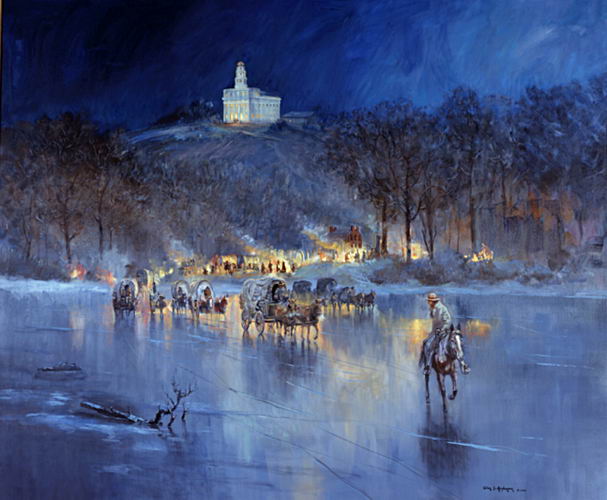On February 4,1846 thousands of members of The Church of Jesus Christ of Latter-day Saints faced unimaginable adversity when they were forced to leave their homes at gunpoint. In near-zero degree weather, Charles Shumway helped ferry 3,000 men, women and children across the frigid Mississippi River to escape mob violence, with nearly 11,000 more fleeing in the following months. Perhaps some of these travelers paused to reflect on the sacrifice they were leaving behind—their warm homes, thirty-eight general stores, four quarries, gardens, orchards, farms, mills, schools, public halls, and a magnificent temple. (Link)
In a recent BYU devotional, Elder David A. Bednar used this example of the early Saints’ persecution and adversity to teach us about the power of keeping temple covenants. He relayed the story of the Nauvoo Exodus because it not only poignantly describes the adversity they faced, but it also points to what got them through their excruciating circumstances:
The winter withdrawal from Nauvoo in particular caused unimaginable hardship for these faithful Latter-day Saints, and many sought shelter in camps along the Mississippi River. When word reached Brigham Young at Winter Quarters about the condition of these exiles, he immediately sent a letter across the river to Council Point encouraging the brethren to help—reminding them of the covenant made in the Nauvoo Temple. He counseled: “Now is the time for labor. Let the fire of the covenant which you made in the house of the Lord burn in your hearts, like flame unquenchable.” Within days, wagons were rolling eastward to rescue the struggling Saints.
He continues:
In their extremity, these devoted disciples were keenly aware of their dependence upon God and trusted in Him for deliverance. … Through their faithfulness, those stalwart Saints invited “the fire of the covenant” and “the power of godliness” into their lives. Strengthened and enabled by that fire and power, they were blessed to trek westward “with faith in every footstep.”
Elder Bednar then asks questions about adversity that can be applied to every single member of the Church today:
What was it that gave those early Church members such strength? What fueled their devotion and enabled them to press forward in overwhelmingly adverse conditions? It was the fire of the temple covenants and ordinances that burned in their hearts.
And so it can be with us in our day.
While we may not be fleeing our homes from armed mobs in the middle of winter like these Saints did nearly 175 years ago, we too need the strength of our temple covenants to help us with the very real adversity we now face. “The Family: A Proclamation to the World” explains the power of temple covenants and ordinances:
“Sacred ordinances and covenants available in holy temples make it possible for individuals to return to the presence of God.” (Sentence C, Paragraph 3)
Not only can we return to the presence of God, but the scriptures teach that “the Lord is in his holy temple” (Habakkuk 2:20) and “Yea, and my presence shall be there, for I will come into it, and all the pure in heart that shall come into it shall see God” (Doctrine & Covenants 97:16) and “that all people who shall enter upon the threshold of the Lord’s house may feel [His] power” (D&C 109:13).
Connecting Our Ancestors to Our Adversity
Do we need His power through temple covenants and ordinances today as much as they did in Nauvoo? Are their trials more difficult than ours? Of this, Elder Neal A. Maxwell has written:
“Though we have rightly applauded our ancestors for their spiritual achievements (and do not and must not discount them now), those of us who prevail today will have done no small thing. The special spirits who have been reserved to live in this time of challenges and who overcome will one day be praised for their stamina by those who pulled handcarts”
Elder Neal A. Maxwell
The same temple covenants, priesthood ordinances and ‘fire of the covenant’ that sustained the early Saints in Nauvoo will sustain us today. Lessons learned from Nauvoo and by those who pulled handcarts are connected and meaningful to our journey today. And, knowing that our ancestors may one day praise us for our stamina means we, too, can expect to accomplish the impossible through the fire of our covenants.
Interested in more research on the power of temple and family history in the lives young people? Visit Paragraph 3 of this website to learn about the protective influence of the family and knowing its history can have on the rising generation. Also, don’t miss our fascinating ‘Raising Family’ podcast with BYU professor Brian Hill about research on the power of family traditions.

